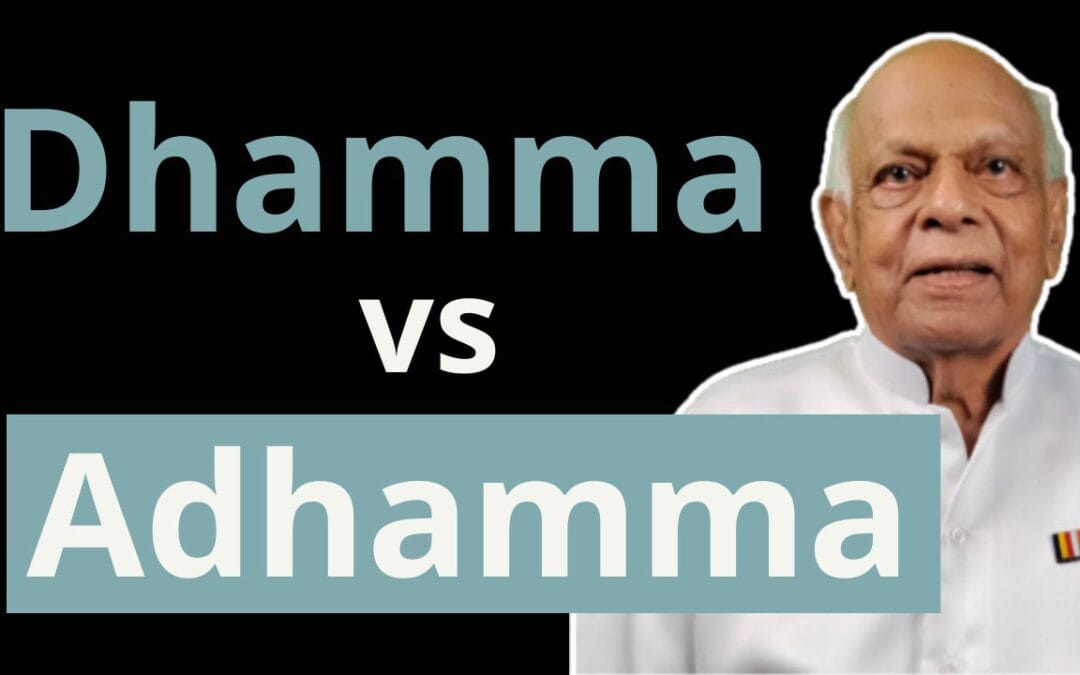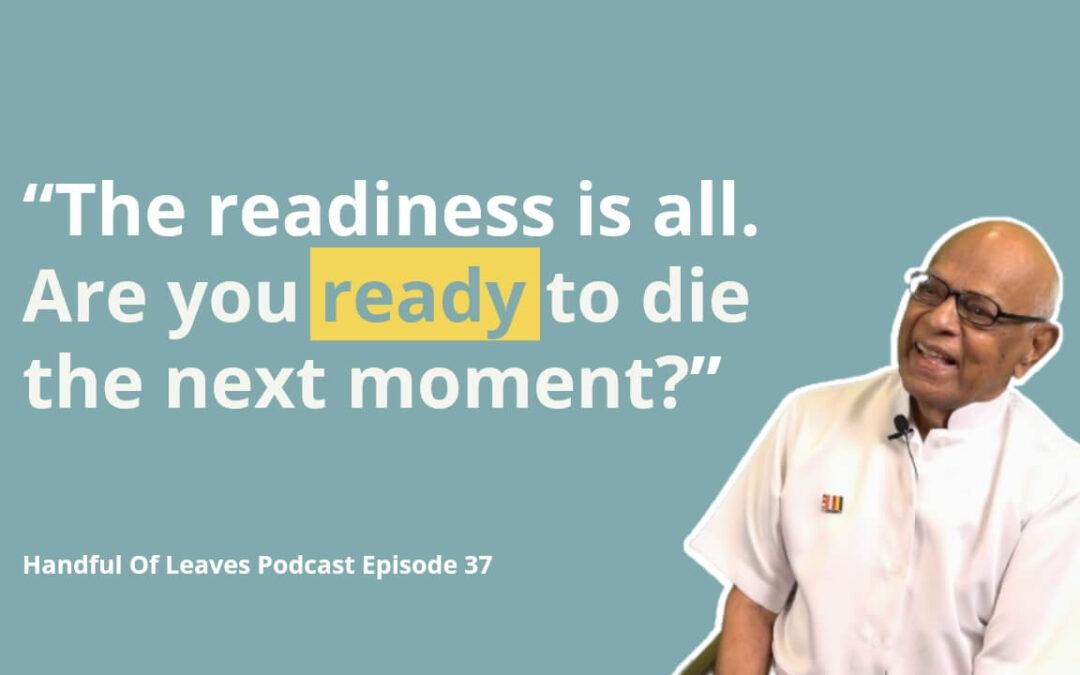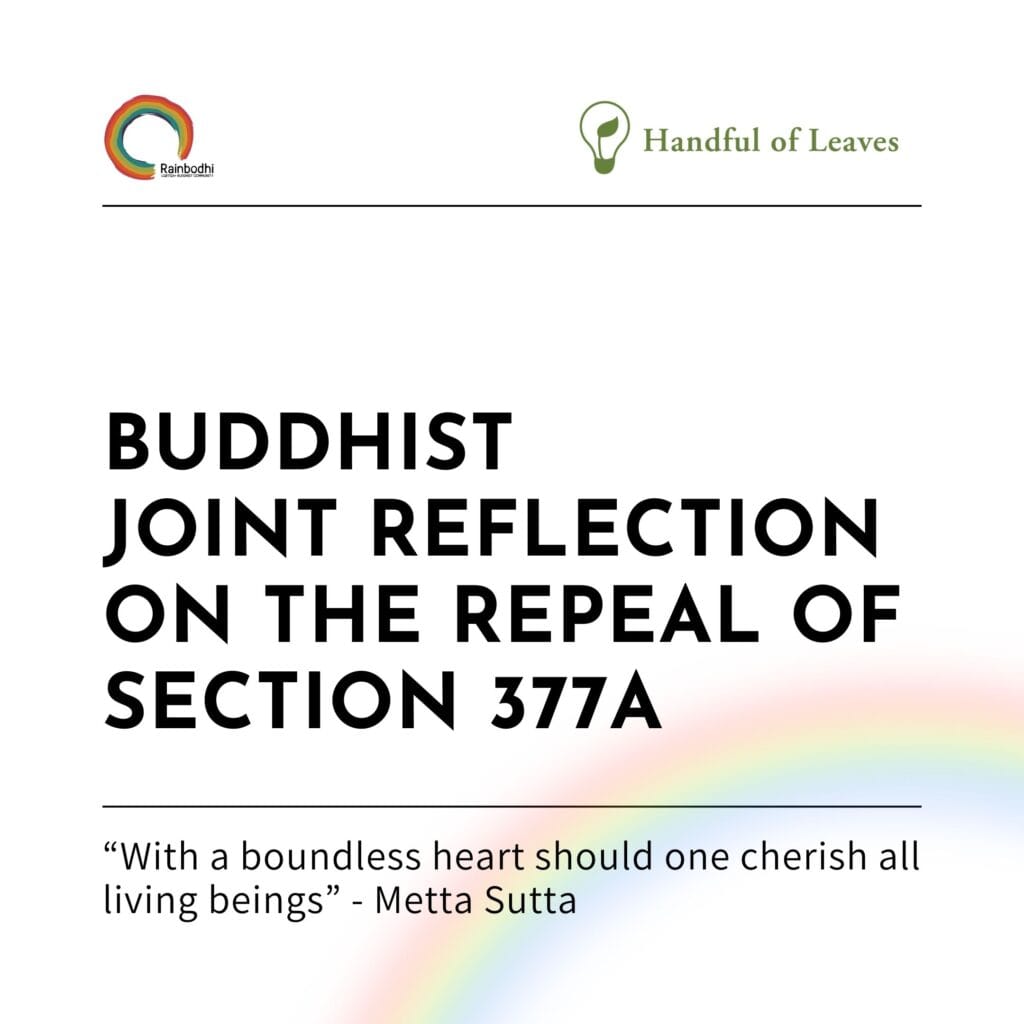
Dhamma vs. Adhamma (ft. Uncle Vijaya)
Summary
In the vast ocean of teachings, how do we discern the true Dhamma from the false? This question echoes through the ages, resonating in the hearts of seekers and practitioners alike. In a recent conversation with Uncle Vijaya, we delve deep into this inquiry, shedding light on crucial steps for navigating the path of Buddhism amidst a sea of teachings.
About the Speaker
Vijaya Samarawickrama, fondly known as Uncle Vijaya, is a respected figure within Buddhist communities, delivering countless inspiring Dhamma talks at universities, schools, and Dhamma centres throughout Malaysia, as well as in Singapore and Australia, spanning over six decades. In addition to his speaking engagements, he held the role of Patron at the Sasana Abhiwurdhi Wardhana Society in Kuala Lumpur and served as the Chairman of Nalanda Institute’s Education team. He represented Malaysia in various Buddhist conventions and conferences, both locally and internationally. He has authored over a dozen booklets, with more than 150,000 copies distributed worldwide. Before his retirement, he held the position of a senior lecturer at Universiti Teknologi Malaysia and worked as a lecturer in Drama and Theatre, Public Speaking, and World Religion at Taylor’s University American Degree Program.
Key Takeaways
Staying Faithful to the Buddha’s Words
At the heart of discernment lies the Buddha’s seal of approval. Uncle Vijaya emphasizes the significance of aligning teachings with the canonized scriptures, known as the Nikayas. These ancient texts, meticulously preserved through oral tradition, serve as a benchmark for authenticity. As the Buddha explained to Venerable Gotami in Aṅguttaranikāya (Numbered Discourses) 8.53:
“You might know that certain things lead to dispassion, not passion; to unyoking, not to yoking; to dispersal, not accumulation (of worldly gains); to fewer desires, not more; to contentment, not lack of contentment; to seclusion, not crowding; to energy, not laziness; to being unburdensome, not being burdensome. Categorically, you should remember these things as the teaching, the training, and the Teacher’s instructions.”
Guidance of Wise Teachers
In the journey of discernment, wise mentors illuminate the path. Cheryl and Uncle Vijaya stress the importance of seeking guidance from experienced practitioners who embody the teachings they impart. Discerning true Dhamma requires more than intellectual understanding; it demands experiential wisdom nurtured through the guidance of compassionate and knowledgeable teachers. With humility and patience, seekers can gradually deepen their understanding and practice, following the footsteps of those who have traversed the path before them.
In essence, discerning true Dhamma from false teachings is a journey of self-discovery and inner transformation. By anchoring ourselves in the Buddha’s timeless wisdom, seeking guidance from wise mentors, and nurturing inner virtues, we navigate the path with clarity and purpose. As Uncle Vijaya reminds us, amidst the myriad teachings and traditions, the true Dhamma shines as a beacon of liberation, guiding us toward the ultimate goal of awakening.
Transcript:
Full Transcript
[00:00:00] Cheryl: Welcome to the Handful of Leaves podcast. My name is Cheryl. And with me I have Uncle Vijaya. For those who are big fans of our YouTube and our podcast, you will recognize that Uncle Vijaya has done an episode with us before. So I’m very excited to have Uncle Vijaya back.
I’m excited to be here too.
Awesome. we will be talking about distinguishing between false Dhamma and true Dhamma. nowadays there’s so many people who teach Dhamma. If you just Google or you just YouTube, everyone calls themselves a Dhamma teacher.
We have lay people, we have monastics, random people. So information is everywhere and anyone can package their teachings as the way to enlightenment. So for those who are interested in Buddhism, how can we discern that we’re truly learning the Buddha’s words and the Eightfold path?
So, Uncle Vijaya is awesome. He’s so experienced, very, very experienced Dhamma teacher. And I can’t think of anyone better who will enlighten us on this topic.
[00:01:06] Uncle Vijaya: No.
Thank you. Okay. So, what we in Buddhist circles would call what you are referring to is Adhamma. Dhamma is that which is approved by the Buddha, taught by the Buddha, and we’re very fortunate that even during the Buddha’s time, when he was still alive, what he taught was codified, classified and approved by the Buddha. I’ll go into that in a minute. But, during the Buddha’s time also, this was necessitated by the fact that there was a lot of Adhamma going on. Adhamma meaning that which is not Dhamma.
And a lot of people were either on their own making claims or for publicity purposes, misrepresenting the Buddha. One is misrepresenting, one is genuinely not understanding. Behind all of this is the fact that the Dhamma is not easy to understand. It is not for the faint-hearted. Yeah, the Buddha realized that immediately after his enlightenment. He asked himself whether he should share this Dhamma, which has brought him so much of personal benefit. Then he hesitated And he said it’s too difficult.
It is too complex and it is may not be worth his while to try and explain it to people whose eyes are covered with dust, who cannot see. So it’s a waste of time. He was on the verge of moving away because of the possibility that Adhamma would interfere. Whether he wanted to go and waste the rest of his life or the thought occurred to him, why don’t he become a Pacceka Buddha. Pacceka Buddhas are Buddhas, in exactly like our Buddha but they do not have the ability to teach. So they are called silent Buddhas. So the Buddha thought of becoming a Pacceka Buddha.
[00:03:25] Cheryl: This is a very profound moment because in the past the Buddha actually forsake the opportunity to become an Arahant because he wanted to become a Buddha to benefit all sentient beings.
But the fact that when he became a Buddha, he then had the doubts of whether he should teach. So it really points to how sublime this Dhamma is.
[00:03:48] Uncle Vijaya: How sublime…… It wasn’t the failing on the Buddha’s part, but the Buddha’s own realization of whether there are beings that would understand. Why waste? Why cast pearls before swine? You know, so when that thought occurred to him, we are so lucky. Venerable Sangharakshita says that mankind’s fate hung in the balance, very dramatic. Now, should I, should I not. And then Maha Brahma comes down and pleads with the Buddha and says, please do go ahead and teach because there are beings with little dust in their eyes.
And then the Buddha said, it’s not that the Buddha needed to be told that, the Buddha knew it. But I think this is the way of expressing that there was a need, and there was the assurance. History has shown that he made the right decision to teach because there were so many who benefited right down to our own time.
Okay. So it was Maha Brahma who pleaded with the Buddha to teach the Dhamma, and the Buddha proceeded. And the Buddha achieved a lot. During the 45 years of his teaching, there was so much of Adamma as well.
Some were doing it viciously, others were doing it innocently. They didn’t understand. And the Buddha had to constantly remind his followers to go ahead and follow his Dhamma. And he made many, many discourses where he separated the Dhamma from the Adhamma, yeah?
How do you differentiate between the two? And we are fortunate in that the Buddha himself Approved what is Dhamma and what is not.
One incident is, just before the Buddha passed away, the Buddha was already quite old, reaching the end of his career, and one of the strongest opponents, those who are teaching other views, was a Philosopher called Nigantha Nātaputta. And he had just died.
And after he died, because he had not made clear what it is that he was teaching, and he made final decisions on what to teach and what not to teach, when he died, there was a huge amount of controversy. And it became very ugly.
Okay. Now we come back to the Buddha. So the Buddha was in this place, and he had given the Dhamma talk, and he said, okay, now it’s time. I want to rest. And it goes, Sariputta, while I am resting, I can see that the monks are very alert, they are not sleepy, you see, and they are ready for more Dhamma talk. So while I rest, you go ahead and teach on my behalf.
Get the picture? It’s late in the evening, Buddha had just finished, monks were still alert and ready to listen more. And Sariputta was told, okay, please deputize for me. And Sariputta said, now that Nigantha Nātaputta has just died, there’s so much of controversy because there’s no authority to say what is the truth and what is not. We will avoid this. So he said that to do this, he will list out everything that the Buddha taught. Now we know that the popular saying is there were 84000 units of Dhamma that the Buddha taught over his 45 years. So he said, let us codify that. Let us collate that. Let us organize that.
Okay, and remember it was a culture which had no writing. It was an oral culture. and Venerable Sariputta decided to chant together in the Digha Nikaya. Yeah, it is recorded as the chanting together, Saṅgīti Sutta (DN 33). So he said, let us all together recite everything that the Buddha taught, right? And they used a device which we use for remembering, mnemonics because it’s not a written device. It’s an oral thing and to remember, so what they did was they put this knowledge that they had accumulated, uh, codified it into 1, 2, 3.
What is 1…
what is 2…
what is 3… Triple Gem. Anicca, Dukkha, Anatta. All the 3s, all the 4s, all the way down.
So the whole night, Sariputta and the rest of the monks together recited everything, they rehearsed. Everything that the Buddha spoke on in ones, twos, threes, fours, and so on, right? And by the time they finished, it was already morning. And the Buddha got up from his rest. And he said, I heard it all. I approve. Sadhu! Yes, my hair also stands on end, Sadhu! Because that tells us that we have right down to our time what the Buddha taught. This is the Dhamma, right? And anything that is not included in this, that is not the Dhamma.
[00:09:51] Cheryl: So, this gives a lot of assurance and confidence that whenever we hear something that we’re not sure of, we can go back and check because the Buddha gave the stamp of approval.
[00:10:02] Uncle Vijaya: Absolutely. That was when the Budha was still alive. Immediately after the Budha died, seven months after he died, we had the First Council (483 BC). And in that First Council,
Venerable Ananda, “thus have I heard”.
One of the arrangements that Venerable Ananda made with the Buddha before he agreed to serve him was whatever Dhamma talk that the Buddha gave, if he had not been present, the Buddha would repeat. So, Venerable Ananda, he had a fantastic memory. Yeah, he listened and he remembered everything that the Buddha had taught in his presence as well as outside of it. For example, it is said that he spent three months in Tāvatiṃsa heaven preaching to his mother.
When he came back, he repeated that to Venerable Ananda, so that when the First Council took place, very soon, while it was still hot it was recorded again, using the same mnemonic device of ones, twos, threes. So we can be rest assured that this is the Dhamma. If any other teaching comes about later, well and good, provided that it fits in with the teaching of Dhamma.
Why did I say that? Because the Buddha said don’t reject everything as not Dhamma. Sometimes it can qualify, although the Buddha himself didn’t say it’s Dhamma, because he says his teaching is like the footprint of the elephant. It is the biggest footprint in the jungle. All other footprints will fit into that.
So other religions would also teach Dhamma mixed with Adhamma. The Buddha’s Four Noble Truths is the Dhamma and it’s not adulterated. This is the beauty of the Buddha’s teaching from then until now. Don’t condemn everybody else. He always says don’t condemn others. What they say may have elements of Dhamma. Look for that. And then this coincides with what the Buddha had taught. So accept. This way we avoid a whole lot of quarrels and so on. To say that all religions teach false, except Buddhism, the Buddha says, no, that is not a sensible way of approaching it. Yeah, if what they say coincides with what the Buddha said, well and good.
If it is not, without rancor, without anger, without bad manners, don’t reject. Just let it go. There you go. Just don’t accept. So this is the Dhamma and Adhamma. We are saying this because in today’s day and age with internet and so many new knowledges coming in, people are free to think for themselves.
Buddhism never stops you from thinking for yourself, but whatever is thought must be in line with the Dhamma.
[00:13:22] Cheryl: I’m just thinking about this question because a lot of it depends on our own independent investigation of what the Buddha said, right? The suttas. But as beginners, sometimes the suttas can be very difficult to understand.
We’re a blank slate in that sense.
[00:13:41] Uncle Vijaya: Yes. Okay. The Buddha has an answer for that. He says his Dhamma is very deep, but it is like stepping into the ocean.
When you are on the beach, only your toes get wet, but the deeper you go, it becomes more and more complex. So, start with the basics. Start with the basic, which is the Four Noble Truths. Take as much as you can, for which you need competent teachers. Now, teachers can be those who are part of the tradition, all our Sangha community.
Lay Buddhist speakers and so on on the one hand, all right. Then of course we have the advantage of the internet. We have the technology, so we can use that as well. Take it a little bit at a time, don’t jump into the deep end of the pool. Like the Buddha says, first get your toes wet, then get your knees wet.
Don’t go and jump into the pool and say, tomorrow I want to be an Arahant. It is a gradual path. So, to answer your question, look for teachers who will take you by the hand. My own teacher was Venerable Narada, all right? And then, of course, the late Chief.
And they didn’t teach me about Abhidhamma at the beginning. They taught me how to be a good Buddhist on a day to day basis. I was comfortable with that. I didn’t need to go jump into meditation and all. And as I went along, I went deeper, so that way you don’t get frustrated. A lot of people jump in with too high expectations, and then they give up and blame Buddhism for it.
Buddhism is not to blame. Our approach is the one. So, we always are advised to look for competent teachers. And we are so lucky in this day and age, an unbroken chain from the time of the Saṅgīti Sutta (DN 33) to now, we have teachers who are able to help us to follow, to understand. But we must develop the humility and the patience to say it’s a gradual cannot happen overnight.
Some people are lucky. They are prepared, like in the sutras we hear of people gaining instant Arahanthood. Why? Because it has all been developed in past lives. So like Venerable Assaji tells Venerable Sariputta, just one line and Venerable Sariputta got enlightened. But we have to wait.
[00:16:43] Cheryl: We have to develop our spiritual faculties now. So next time, hopefully someone tells us one line and we get it.
[00:16:48] Uncle Vijaya: Absolute. Little by little, we build them up, okay?
[00:16:53] Cheryl: Yes. And you touched upon the point of having good teachers are very, very important. So what are the qualities that we should look out for in good teachers?
[00:17:02] Uncle Vijaya: A good teacher.
First, their own behavior. How do they carry themselves? Does what they say match what they do. A lot of teachers have the aura so and their own path. It’s easy to see very soon you can see the hypocrite from the genuine. And they’re all around us. There are bogus monks everywhere and you can see. Just look on their wrist if there’s a rolex there then okay, that’s a good indicator. Don’t follow him when he tells you to renounce everything and follow him. So like the little things.
Yeah, be sharp. Be humble. Don’t necessarily say I know better than him. The Buddha says that many occasions especially in the Mahaparinibbana Sutta. The Buddha tells us that when you hear something don’t reject it outright. Don’t accept it outright. If that’s something in praise of the Buddha, don’t necessarily rejoice. Listen and put it against does this tally with what the Buddha said.
Here, let me share with you this quote which I think is very beautiful. A very senior monk in Buddhist and Pali university in Sri Lanka shared this with us.
He quoted an article which appeared significantly in Sri Lanka about somebody telling us how to conduct ourselves. He says, if you are still a lay devotee, enjoy all the worldly pleasures your senses require you to do. And experience that they are not permanent. Now this guy is advising us that if you are still lay people, enjoy life, be hedonistic, you know the five senses.
Because if you don’t know, you don’t know what you’re giving up. When you get fed up, then you give up. Now, this monk is asking, even in today’s day and age, there are people claiming that this is Buddhism. We know that the Buddha has taught us to treat this thing as if it’s like a man whose beard is on fire. If his beard is on fire, he won’t wait to see the end of the fire to examine the scientific reasons for fire and so on.
He will put it out straight away. We are struck by the poison arrow of samsara. We cannot wait until tomorrow. We don’t have up to tomorrow. So you see, this is a good example of Adhamma.
What do we do? We put it against what the Buddha taught. We don’t throw it away and say, no, this is rubbish. Examine, does it make sense? Yeah, does it conform with what I have learned so far about what the Buddha has said? The Buddha says all is suffering. And he says that this suffering persists all the time. Everything is anicca. Anicca meaning everything is impermanent. So, this life now. It’s impermanent.
I cannot wait for tomorrow. I cannot wait. There is no tomorrow. It’s Akalika. It is transcending time. So when this guy says, have fun, enjoy life, and then when you are old, decide to become a Buddhist. No, this is Adhamma. And this monk shared this with us to make this point that even today it is so easy.
[00:21:00] Cheryl: And it’s so scary because it’s like half correct, half wrong, half correct in the sense that yes, we have to contemplate about impermanence.
[00:21:07] Uncle Vijaya: Absolutely. It is that half correct thing. But the Buddha says if we give in to our emotions and simply because we think it does not agree, that will cloud our thinking.
The Buddha says, don’t rejoice and don’t get angry. Calmly examine what this guy said and say, no, this is not the Dhamma. This is Adhamma. Dhamma is immediately.
Your beard is burning, or you have been struck by a poison arrow, you don’t wait for tomorrow, right? So to answer this, I go back to the Buddha’s teaching and say, I cannot accept this.
So it is very difficult because especially today, with the commercialization of Buddhism through mindfulness training and all of that, it’s so easy for us to think that if we do all of this for material gain. See, there, whatever the Buddha taught was to lead us towards renunciation, to lead us towards giving up.
Here we are, how to make millions using mindfulness. I brought this up with Venerable Jayasaro and asked him, is it not wrong for them to use? He said, no, because mindfulness in itself is good. So if a person practices mindfulness, even if it is for the wrong reason, it is better than no mindfulness at all.
Get the point?
[00:22:56] Cheryl: I get the point, but I don’t really agree. If the person, let’s say, trains to become a sniper and uses mindfulness training to help them to kill more people, isn’t that wrong all the way?
[00:23:08] Uncle Vijaya: Yes, it is wrong all the way. It is definitely wrong. Hitler, for example, probably was very mindful, but he was wrong. We cannot approve. This is where the Buddha says, step back. Is this possible? This is not. But we have to admit that all over the world, people who go into mindfulness, whatever the reason, have become calm. So the immediate fallout from that is better calmness, maybe more patience.
And hopefully later he will step into the path, but that is better than allowing him to go into the way of, remember those days, the character training, they treat you as a doormat, and people are making lots of money, kill everybody, jump on the top, that kind of very bad teaching on materialism is sort of gone out of fashion today.
More people are into mindfulness. So maybe it’s a slow but better movement. Maybe we are getting more intelligent. Maybe we are getting slightly more wise.
[00:24:22] Cheryl: At least it’s a step in the right direction.
[00:24:24] Uncle Vijaya: A little step in the right direction.
[00:24:28] Cheryl: So what if we have friends who follow the guidance of wrong teachers? So meaning we think their teachers are wrong because of perhaps their ethical conduct or perhaps their teachings are a little bit fishy. How can we help them?
[00:24:47] Uncle Vijaya: We can help them first, go back to again what the Buddha advised. First thing is don’t reject them. Don’t condemn them. Don’t take an antagonistic view. Don’t pity them. Yeah, all of them. Don’t lose your respect for them. They are thinking wrong but you have to practice your Metta, Karuna, Mudita, Upekkha all the time. Always remember that whenever you want to go and condemn somebody you condemn yourself first because you have gone into anger and so on.
So first thing is develop a mind of Metta towards everybody. Follow the Buddha’s teaching. Take it, test it against what he had taught. Is this Dhamma? Is this not Adhamma? If it conforms with what the Buddha taught, accept it. If it does not, mindfully, carefully, without anger, explain to your friend, this is not Dhamma.
If he chooses, not to follow, like in the case of Devadatta, no matter what the Buddha did, he constantly went against the Buddha. If that is the case, then leave it. The Buddha left him alone. There was this other guy, Channa. Channa was very proud and Channa became a monk and he was impossible to control to the point that even the Buddha couldn’t control him.
He was so egoistic. The Buddha advised the monks to boycott. Boycott, not out of anger or whatever, but we can’t do anything with you, we better leave you alone. So that is the advice we are given. Don’t compromise ourselves. Don’t go into anger, condemnation.
People who are too enthusiastic about their religion. They want everybody to follow their way and they condemn anybody who doesn’t. Buddha says, no, don’t do that. Don’t compromise yourself. You must all the time be that lotus flower. If you can change, effect the change. A lot of people have trouble with convincing their parents. Good to go from wrong behavior to right behavior.
If you can, it’ll be good if you can change. But to fight and create more anger and hatred, that is not the Buddhist way. Patience, tolerance, understanding. So use those three as your guidelines. If possible, change people with wrong views. But if it is not possible, leave them.
[00:27:42] Cheryl: And sometimes the wisest thing is to actually walk away, because that is a form of understanding that any more effort that I try will just lead to unwholesome states to arise.
[00:27:53] Uncle Vijaya: For me, so before I throw, you know, filth, I must remember my hand will get dirty first. But that shouldn’t give rise to a sense of superiority. A lot of people we know saying, Oh, I am safe. Oh, I’m a good Buddhist. You know, I follow that guy is going to hell. That kind of superiority also is ego that we have to guard.
That’s more difficult to guard against. A lot of people take a very self righteous view. The Buddha constantly warns us, don’t be self righteous. You can help the person. More than being self-righteous you have to develop metta, karuna, more karuna, compassion for his wrong view. Metta, karuna, mudita.
Upekkha is that highest level. Don’t suffer with the suffering.
[00:28:54] Cheryl: And once people, let’s say, once people leave these wrong teachings, what I think can happen is they lose faith in Buddhism altogether because what they knew to be Buddhism is completely wrong. And if they find that out, they could be very lost. So how can we support them after they leave in that sense?
[00:29:17] Uncle Vijaya: Well, partly we can put it down to their own kind. They are not ready yet. Yeah, they may not be bad people. This is an important point to say. You have to see whatever goodness. There’s nobody who’s totally bad or totally wrong. All right, whatever good that he does, could eventually serve him in good stead to bring him along the right path.
Maybe this life, it went wrong. All right, hopefully next life he is born into a Buddhist family for whatever good he did, follow the right way, then he is safe. One way. Another way is to accept that not everybody can follow the path in the same way. So, support them to the extent that we can. Don’t make matters worse by being self righteous, as I said. By trying to change that person and creating more anger, more hatred. Maybe the better approach is to move, of course, radiating Metta, you know, behaving towards him with the same compassion, without a sense of superiority.
[00:30:33] Cheryl: Thanks so much for sharing and I’m just wondering if there’s anything that you have prepared that you want to share?
[00:30:38] Uncle Vijaya: I would like to share a lovely story. There was this monk, yeah, his name was Punna. Punna came to the Buddha one day and told the Buddha, Master, I want to go away to a very far away country and share my life with the people there.
But before I go, can you please give me a short teaching that I can use to meditate? So the Buddha gives him that short teaching, which is to do with the five senses. Whenever we use our five senses to attach to objects in the world, that leads to pain and suffering. The same five senses, when they attach, we do not connect, we disengage ourselves from this, that leads to happiness.
So that was a short teaching. Then the Buddha says where are you going? And Punna says, I’m going to a place called Sunaparanta. And Buddha said, you’re going to that place? That’s a very dangerous place. The people there are very unfriendly. What will you do if those people ridicule you?
If they ridicule me, he says, I am so happy they’re only ridiculing me, they do not hit me. And the Buddha said, what if they do hit me? Then he said, I will say, I’m so happy they only hit me with a stone, but they didn’t hit me with a stick. Then what if they hit you with a stick? Then I’ll say, they didn’t hit me with a knife.
And, what if they do hit me, then I’m glad they didn’t kill me. What if they do kill you? Then I will say, I’m very happy that I am waiting to leave this existence. I’m waiting to attain Nibbana. These people have helped me. So in all instances, I will maintain goodwill towards them. And the story goes that the Buddha said, now you are ready to go.
So I’ve said this because your question about how do we treat people who are antagonistic towards us. Always find something positive. Always develop your four Brahmaviharas. And the story goes that he did go, and he did meditate on what was told, he became an Arahant.
They came back and told the Buddha, Punna had died, he said, yes. It never bothered me, he didn’t ask me too many questions.
[00:33:32] Cheryl: Such a short yet profound teaching.
[00:33:34] Uncle Vijaya: There’s one I’d like to share with you I think this is relevant. The Buddha’s foster mother was Mahāpajāpatī Gotamī. You have been asking me how to tell right Dhamma and wrong Dhamma, okay? Well, Venerable Gotamī came to the Buddha and said, There are so many teachings. How do I tell the right Dhamma from the wrong Dhamma?
Your question. And the Buddha explained, of whatsoever teachings, Gotamī, thou can assure yourself thus. If I hear anything that makes me more angry or more happy,
conduce to passion, not to dispassion,
to bondage, not to detachment,
to increase of worldly gain, not to decrease of that,
to covetousness, not to frugality,
to discontent, not to content,
to company, not solitude,
to sluggishness, not energy,
to delight in evil, not delight in good. If any of these teachings lead in that direction,
of such teachings, you may with certainty affirm, Gotamī, this is not the norm. If any of these apply, then this is not what I taught.
This is not the discipline. But of whatsoever teachings you can assure yourself that they are the opposite of these things that I have told you, these teachings you may with certainty affirm, this is the norm. This is the discipline. Now, we can see in the world today, so many teachings, so many ways of behavior that is increasing so much anger, hatred, all in the name of religion, we can safely say, this is not what the Buddha taught. But if it teaches compassion, if it teaches sharing, if it teaches peace, solitude then this is what the Buddha taught. So it’s very basic, very simple, right? A lot of your questions you asked is answered by that.
[00:35:46] Cheryl: This is a beautiful checklist, right? That is offered by the Buddha.
[00:35:53] Uncle Vijaya: By the Buddha himself. So we don’t need to go anywhere else. We are constantly told, go back to the Nikayas. I have one more way of checking.
Do these ways of thinking appear in the Nikayas? I remember the one who said, enjoy your life so that you get fed up, then you give up. Now, is it in the Nikayas? No, there’s nothing in the Nikayas.
[00:36:19] Cheryl: And I’m well, I’m curious. What about within Buddhism? There’s so many different traditions.
Yeah. And they can be most of them are similar, but some can be quite different, especially in terms of the focus and the meditation techniques. And I tend to lean towards the conservative side, meaning if I found a tradition that I feel like, okay, that’s It helps me. I think that I am aligned with the teachings.
And I believe this is the same for many people as well, where they say, don’t go and confuse yourself.
[00:36:51] Uncle Vijaya: Four Noble Truths. That’s all the Buddha teaches.
He kept saying that. I only teach one thing, suffering, the end of suffering. All that I’m here to do is to teach you to be happy. Now you want to find this by being happy, Go ahead. Does it make you happy? Gotami again. Yeah. Certainly I agree with you. I’m a Theravadin. I have accepted it.
I have a great deal of interest in what all the other traditions teach. I have found after so many years that all these great traditions all teach the same Four Noble Truths. The Buddha’s teaching is so comprehensive there are all these different methods to suit different personalities. Even the Buddha himself, he didn’t teach the same thing to everybody.
He saw people’s capacities. Intelligent people, he taught intelligent things. People who couldn’t understand, he just said, rub this white cloth… you can become enlightened, these traditions of Buddhism arose to suit different temperaments, but do they all lead to the ultimate truth?
Do they all lead to nirvana it does for those individuals? So be it. I have enough problems looking after my own salvation. I don’t even have time to worry about my grandchildren.
[00:38:36] Cheryl: Yeah. And then it goes back to the point that time is so limited. This human rebirth is so, so rare. Yes. What are we doing? Why waste our time being a busy-body.
[00:38:49] Uncle Vijaya: Exactly. You just follow the Four Noble Truths. Do good. Avoid evil. Purify the mind. It’s simple as that. All these Nikayas, all these, it’s good for the intelligent man.
But what the Buddha says that we don’t want all that, we don’t need all of that. We need the simple do good, five precepts, avoid evil, five ennoblers, purify the mind. Rid your mind of lobha (greed), dosa (aversion), moha (delusion). You’re free, but it’s very, very difficult. You know that story, don’t you?
About this guy, Bodhidharma. Bodhidharma is the great Indian saint who brought Buddhism to China and Japan. Anyway, on his way to China, he was stopped by a chief. When the chief caught hold of Venerable Bodhidharma, he said, teach me about Buddhism. Bodhidharma was going to go into a one hour talk. He said, no, I don’t have time for that. Just tell me in four lines. What does Buddhism teach? Very easy. Do good, avoid evil, purify the mind. This is the teaching of all the Buddhas. So the guy says, if that is all, then your Buddhism, any child of five can understand.
A child of five can understand, cannot practice. That is the point. Purify the mind. Do good, avoid evil. I think most of us can. Purify the mind to remove the anger, hatred, jealousy, all of this, you know, mess up the mind. Can we clarify that?
If, as he says to Gotami, if all these different traditions can help me purify the mind, your tradition may not help me purify my mind. My tradition, I’m comfortable. So I find the tradition that helps me best.
[00:41:04] Cheryl: Thank you so much for sharing. And I think with that, we can come to the end of this episode as well. I personally gained so much from Uncle Vijaya’s teachings where he puts things in such a simple way to understand, cuts through all the nonsense and go back to the Buddha’s teachings, check against what He mentioned or didn’t mention. From there with a clear mind, objective mind discern for ourselves whether whatever information that we gain can actually benefit us or not. Thank you to all our listeners who have come towards the end. And I hope you like this episode. Give us five stars and share this with your friends.
See you stay happy and wise.
Resources:
- Buddha’s advice on distinguishing True Dhamma from False Dhamma: Aṅguttaranikāya (Numbered Discourses) 8.53 https://suttacentral.net/an8.53/en/sujato
- The Story of Puṇṇa: Saṁyuttanikāya (Linked Discourses) 35.88 https://suttacentral.net/sn35.88/en/sujato
Special thanks to our sponsors:
Buddhist Youth Network, Lim Soon Kiat, Alvin Chan, Tan Key Seng, Soh Hwee Hoon, Geraldine Tay, Venerable You Guang, Wilson Ng, Diga, Joyce, Tan Jia Yee, Joanne, Suñña, Shuo Mei, Arif, Bernice, Wee Teck, Andrew Yam, Kan Rong Hui, Wei Li Quek, Shirley Shen, Ezra, Joanne Chan, Hsien Li Siaw, Gillian Ang, Wang Shiow Mei, Ong Chye Chye, Melvin, Yoke Kuen
Editor and transcriber of this episode:
Cheryl Cheah, Susara Ng, Ke Hui Tee
Get connected here:
Telegram Instagram YouTube Facebook









